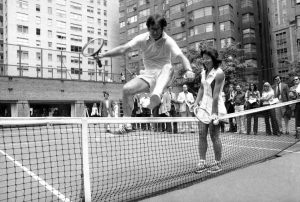
I just read a fascinating article about a fellow named Jimmy Goldstein who is identified as a Lakers Superfan in a Misleading Headline about the Los Angeles Lakers missing the playoffs for the sixth season in a row. The problem is that Goldstein is not a Lakers fan at all, although he loves NBA basketball, claiming to spend nearly half a million dollars a year traveling around the country to see various games.
The implication of the Misleading Headline is that Goldstein wants to see the Lakers miss the playoffs perhaps because he doesn’t like the current coach, because he thinks LeBron James was not a good acquisition, or is unhappy with the direction ownership is taking the team. At least that’s what I thought when I was baited into clicking on the article and perusing it.
It turns out Goldstein, who has had courtside season tickets to the Lakers since 1962, doesn’t like the team and enjoys watching them lose. He hasn’t had much to be cheerful about since the Lakers moved to the City of Angels all those years ago as they’ve been arguably the most successful franchise in the league. So, he’s enjoying the current losing streak immensely and pointedly says that: Lakers fans deserve it.
Now, I certainly question Goldstein going to all those games if he doesn’t like the Lakers. Even if they were a horrible team it seems like an odd way to spend your time. I certainly wouldn’t want to watch games at Wrigley Field for the rest of my life whilst rooting against the Cubs, even if they lost most of the time, a practice I hope they resume again soon. Still, he’s a big NBA fan who lives in Los Angeles and so attends the games. That’s his business. Odd as it seems to me.
In the end, the Misleading Headline should not have called Goldstein a Lakers superfan.
Tom Liberman


















